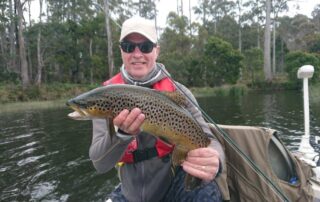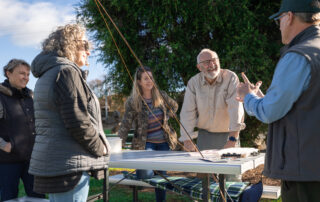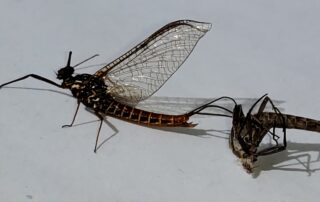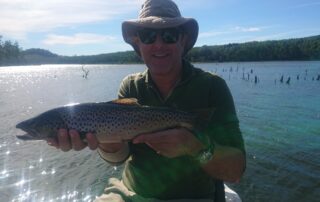Two fly rig fools nice browns
Here's one of a couple of good browns caught through the middle of the day that took a stick caddis underneath or the spinner on the surface of a two fly rig. Image: Gary France
Learning to fly fish
Fly Fishing workshops start off with a chat about trout foods such as fish, snails, and insects etc., that are part of the trout's diet, and the flies we use to imitate them. We show you how to make those imitations move on or in the water. Participants get an overview of fly fishing gear, how to use it, how to present a fly. For beginners, casting instruction and practice starts on the grass, and then we add water! Our workshops are ideal for beginners, as well as those who would like to hone their existing skills. If learning to [...]
Life Cycle of the Tasmanian Mayfly
In Tasmania, developing a sense around what trout foods are available, where and when, increases the chances for success. Mayfly are in full swing from September/October on the lakes and rivers of the lowlands. The highlands follows a little later due to its altitude and climate. These mayfly hatches continue through to around March, peaking again on the lowlands through to the end of April and the season's close. Altitude plays a major role along with water and air temperature; changing light conditions, i.e. cloud cover; and wind and climate. Nymph The Nymph Nymphs live in the water [...]
Trout Territory fly fishing tours in Tasmania
Got a minute? That's all you need to check out this great little video about Trout Territory! Gary talks about Tasmania's beautiful trout fishery and how we can help anglers have a great time when they come fishing with us. This gorgeous video is filmed by IdeasbanQ as part of Tourism Australia's #NECIAUS program. Thank you Merel, Billie-Jo, and Dennis for your fabulous assistance!
Smelt Feeder
On this particular day earlier in April, it was hard to find enough mayfly on the surface or find any fish even looking for them. The tactic here was to find bust ups of small smelt spraying on the surface and the signs of charging trout. We hang in on the zone until they show again, then cast. Mark is pretty happy with this wild brown trout.




